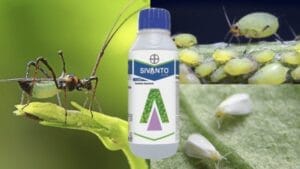No products in the cart.
Know 7 Best Micronutrient Fertilizers for Plants in 2025
Know 7 Best Micro-Nutrients for Crops, Vegetables, and Fruits in 2025
The health and productivity of crops, vegetables, and fruits heavily depend on the presence of essential micro-nutrients in the soil. While macronutrients like nitrogen, phosphorus, and potassium get a lot of attention, micro-nutrients play an equally important role in ensuring better yield and quality. In 2025, with the rising emphasis on precision farming and sustainable agriculture, farmers and agronomists are focusing more on micro-nutrient management.
This blog will cover the seven best micro-nutrients crucial for plant health, their benefits, and frequently asked questions to help farmers optimize their agricultural practices.
What are Micro-Nutrients and Why Are They Important?
Micro-nutrients are essential elements required in small quantities for plant growth, development, and productivity. Despite their minimal requirement, a deficiency can lead to poor crop quality, stunted growth, and reduced yield. These nutrients are responsible for enzyme activation, chlorophyll synthesis, protein formation, and overall metabolic activities in plants.
The 7 Best Micro-Nutrients for Crops, Vegetables, and Fruits:
1. Zinc (Zn)
Benefits of Zinc for Plants
- Plays a vital role in enzyme function and protein synthesis.
- Helps in chlorophyll production, preventing leaf discoloration.
- Enhances seed development and overall plant growth.
Signs of Zinc Deficiency
- Stunted growth and short internodes.
- Yellowing between leaf veins.
- Reduced fruit and grain production.
2. Iron (Fe)
Benefits of Iron for Plants
- Essential for chlorophyll synthesis and photosynthesis.
- Involved in oxidation and reduction reactions in plant metabolism.
- Supports the formation of proteins and enzymes.
Signs of Iron Deficiency
- Leaves develop a pale yellow or white colour.
- Weak root structure and poor yield.
- Affects nitrogen fixation in legumes.
3. Boron (B)
Benefits of Boron for Plants
- Critical for cell wall formation and stability.
- Helps in pollination, seed development, and fruit set.
- Regulates water uptake and nutrient mobility.
Signs of Boron Deficiency
- Poor flower and fruit production.
- Hollow or deformed stems and fruits.
- Tip burn in leafy vegetables.
4. Manganese (Mn)
Benefits of Manganese for Plants
- Supports photosynthesis by activating key enzymes.
- Aids in nitrogen metabolism and root development.
- Strengthens resistance against diseases.
Signs of Manganese Deficiency
Leaf veins remain green while the rest turns yellow.
Poor seed germination and growth.
Reduced fruit size and quality.
5. Copper (Cu)
Benefits of Copper for Plants
Necessary for photosynthesis and respiration.
Strengthens plant immune responses against pathogens.
Supports lignin formation for stronger stems and roots.
Signs of Copper Deficiency
Wilting, especially at the tips.
Dark green leaves with curling edges.
Increased susceptibility to diseases.
6. Molybdenum (Mo)
Benefits of Molybdenum for Plants
Helps in nitrogen fixation in legumes.
Enhances protein production and enzyme activities.
Prevents nitrate toxicity in plants.
Signs of Molybdenum Deficiency
Poor nitrogen utilization leads to yellow leaves.
Stunted growth and flowering problems.
Reduced fruit quality.
7. Calcium (Ca)
Benefits of Calcium for Plants
Strengthens plant cell walls and root development.
Helps in enzyme activation and nutrient absorption.
Enhances disease resistance.
Signs of Calcium Deficiency
Blossom-end rot in tomatoes and peppers.
Weak root systems and plant wilting.
Poor fruit set and reduced shelf life.
FAQs on Micro-Nutrients for Crops, Vegetables, and Fruits!
1. How do I know if my soil is deficient in micro-nutrients?
Soil testing and plant tissue analysis are the best methods to detect micro-nutrient deficiencies. Symptoms like poor growth, discolouration, and low yield indicate possible deficiencies.
2. How can I supplement micro-nutrients in my farm?
You can apply micro-nutrients through foliar sprays, soil amendments, or liquid fertilizers. Organic options like compost and manure also help enhance micro-nutrient availability.
3. Can excess micro-nutrients harm plants?
Yes, excessive application can lead to toxicity, which affects plant metabolism and inhibits growth. Always follow recommended dosage guidelines.
4. Are micro-nutrient deficiencies common in hydroponic farming?
Since hydroponic farming relies on nutrient solutions, deficiencies can occur if the solution lacks balance. Regular monitoring and nutrient adjustments are essential.
5. Do micro-nutrients impact fruit taste and quality?
Yes, micro-nutrients influence fruit texture, taste, and shelf life by enhancing sugar formation and strengthening plant health.
Final Suggestions for Micro-Nutrient Management in 2025
To maximize crop yield and quality, farmers should:
Conduct regular soil testing for accurate nutrient management.
Use bioavailable forms of micro-nutrients to improve absorption.
Implement precision agriculture techniques to optimize nutrient applications.
Consider organic fertilizers for sustainable farming.
Stay informed on innovations in agricultural science for better micro-nutrient utilization.
Conclusion
Micro-nutrients are small but mighty elements that define agricultural success. By understanding their significance and managing their availability, farmers can ensure healthier crops, vegetables, and fruits in 2025. Investing in micro-nutrient management leads to higher yield, better quality, and sustainable farming practices that benefit both growers and consumers alike.
About author
About Author
Other posts byRelated posts
Sivanto Prime, developed by Bayer Crop Science, is a systemic insecticide designed to combat a broad spectrum of sap-feeding pests while preserving beneficial insects. Its... Continue reading
Insect infestation remains one of the biggest threats to agriculture, affecting both crop yields and quality. Farmers often struggle to find an effective and reliable... Continue reading
Protect your crops with confidence using the Barrix Catch Vegetable Fly Trap, a patented, eco-friendly, and reusable trap that targets the notorious melon fly (Bactrocera... Continue reading
Unlock your crop’s hidden potential with Barrix Rootcharger, a revolutionary bioactive solution enriched with acetylated chitosan. This organic powerhouse ignites robust root development, enhances nutrient... Continue reading
Protect Your Crops from Harmful Sucking Pests with Bayer’s Trusted Confidor. Crop protection is critical to ensuring maximum yields and quality produce. Sucking pests such... Continue reading










Add comment